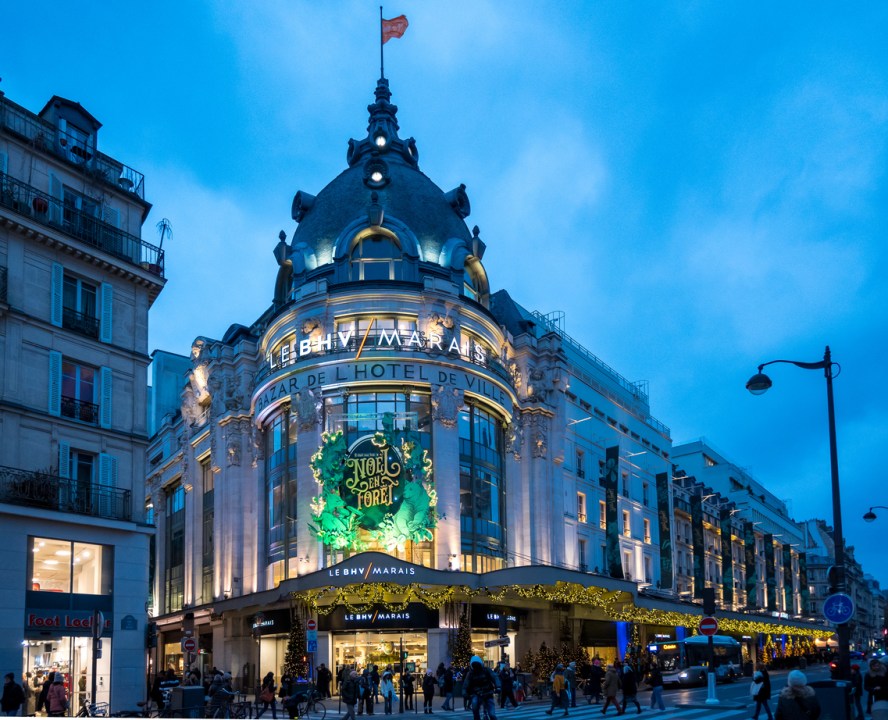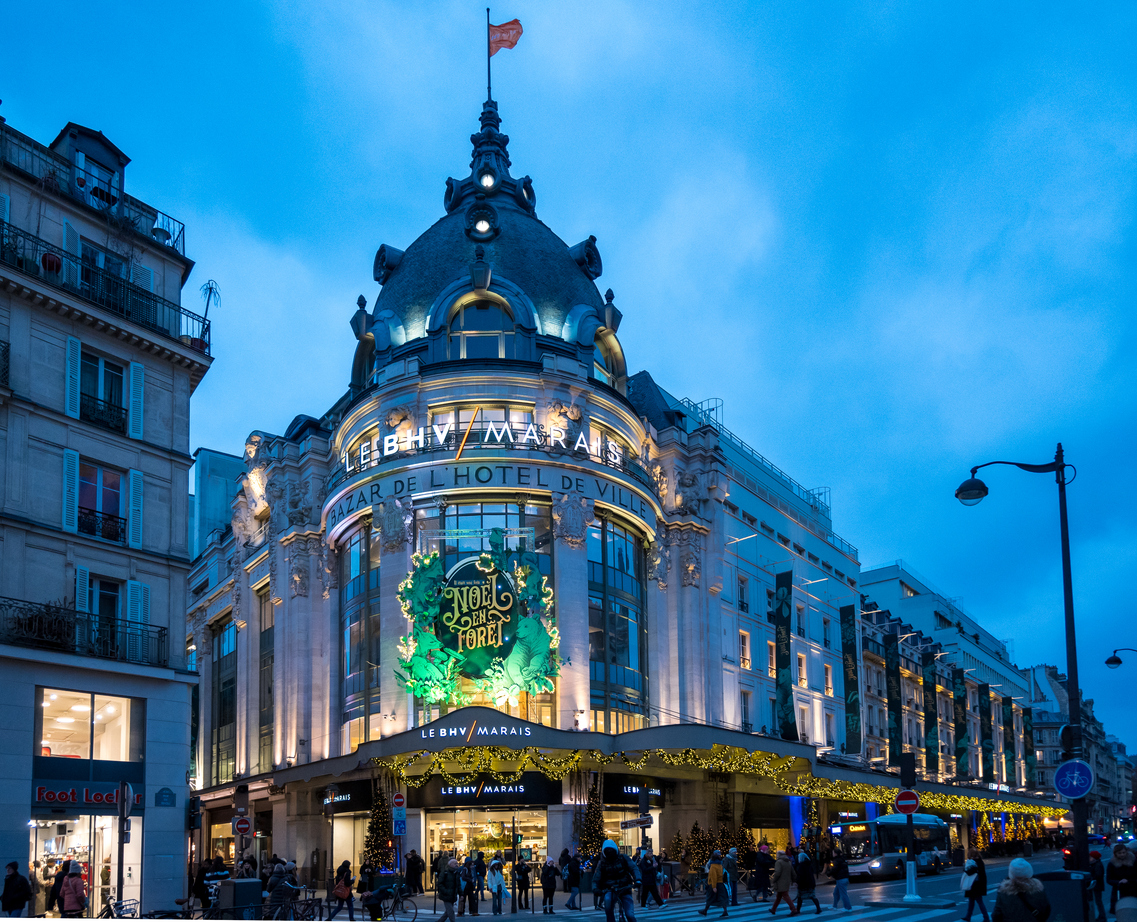The most glamorous department store in Paris, the BHV Marais, a vast art deco landmark stretching along Rue de Rivoli facing the Hôtel de Ville, is leasing space to Shein, the Chinese fast-fashion giant. Once a symbol of Parisian refinement, BHV now finds itself hosting a brand that epitomises disposability. This has sparked demonstrations outside the store and drawing sharp criticism inthe French press.
France can’t save its shops, its factories or its dignity because it no longer believes in the value of producing anything at all
This isn’t just another retail opening, it’s cultural surrender. It is proof that Paris, once the world’s fashion capital, is now renting out its soul to Chinese algorithms. For more than a century, the BHV embodied a certain Parisian ideal of accessible luxury, craftsmanship, good materials and quiet taste. Now it’s flogging throwaway polyester. At the same time the store’s traditional fashion shops are shuttering one by one: the old tailors, the leather-goods stores, the independent boutiques that once defined the Marais.
Founded in China barely a decade ago, Shein has become one of the world’s largest online retailers, offering clothes so cheap they defy the laws of economics and labour. Analysts estimate it processes hundreds of thousands of orders a day worldwide, mostly through its website, which lists over 600,000 products at any given time. It now dominates the global fast-fashion market and is preparing a stock market listing in London. It potentially has a valuation of between $30 and $50 billion.
Yet industry groups allege that Shein avoids the burdens even small French businesses bare, by bypassing duties on low-value imports and benefiting from regulatory gaps.
As protesters gathered outside BHV, commentators have called the move ‘a symbol of public impotence’. The French state, which can regulate the price of a baguette to the centime, can’t stop the flood of cheap clothes arriving from Guangdong. The government mutters about ‘controls’ and ‘customs checks’, but most small parcels entering the EU still escape VAT and duties. France has become addicted to bargain imports even as its own manufacturers die and craftsmanship all but disappears.
Brussels and Paris are apparently paralysed. Customs can’t keep up. Market surveillance finds half of all Chinese imports are non-compliant. Yet the same political class that lectures about sustainability and ‘responsible fashion’ welcomes Shein to the Marais.
What’s true for clothes is true for cars. China sells Europe cheap frocks and cheap electric vehicles, and Europe calls it progress. Brussels lectures about sustainable fashion and carbon neutrality while importing both the carbon and the moral rot. France loses its textile industry to Shein, and Renault and Peugeot are losing the road to BYD and MG. We’re soon not going to have any industry left at all.
And now comes the grotesque sequel. Shein has been caught selling child-like sex dolls holding teddy bears. (The platform has since imposed a ‘total ban on sex doll-type products’ which were listed by third-party vendors, and promised to ‘cooperate fully with the judicial authorities’.) Sarah El Haïry, France’s High Commissioner for Childhood, called the dolls ‘pedo-criminal’, adding that ‘the mere fact they resemble children says everything’.
Triggered by the sex doll scandal, on Wednesday afternoon the French government announced that it is launching an investigation into Shein and has warned that it could move to block or shut down the platform if it fails to comply with French law. Ministers gave Shein 48 hours to demonstrate that its content and listings comply with French regulations. Shein then voluntarily suspended its Frech marketplace hours later. I’d say, too little, too late.
This is more than moral decay. It’s the story of a continent that has lost control of its markets and its conscience. The same customs service that lectures British lorry drivers about paperwork waves through millions of low‑value parcels. The same government that taxes energy in the name of climate virtue, imports billions in coal-powered goods. The same city that was home to thousands of artisans, and produces Dior, Saint Laurent and Renault now imports its dresses and its cars from factories it pretends don’t exist. The fact is that under these conditions, Europe can no longer compete with China. We can’t apply rules and taxes to our own industry and allow in products from abroad produced in a totally different regulatory environment.
The irony is almost comical. France obsesses over banning gas boilers and wood‑fired pizza ovens, yet can’t tax and has trouble vetting the tsunami of goods pouring in from China.
If Shein lists in London, the City, ever pragmatic, will take their fees while pretending not to notice that the company’s model rests on low-cost labour, tax loopholes, and the destruction of European manufacturing jobs. The West congratulates itself on sustainability while turning a blind eye to the exploitation embedded in every ‘affordable’ purchase. The West cannot afford to be virtuous for domestic production and simply turn a blind eye when it comes to imports.
The Shein story is the parable of where Europe now stands politically. Europe once exported style and imported raw materials. Now it imports both its clothes and its ethics. Paris, the capital of fashion, has become a franchise of Shenzhen. France can’t save its shops, its factories or its dignity because it no longer believes in the value of producing anything at all.
The collapse of European industry isn’t the fault of China’s cunning. It’s the price of the complacency of Europe’s politicians. A civilisation that spends its time policing words online while outsourcing its work and its morals abroad is one that no longer knows what it stands for. The tragedy isn’t what China has done to Europe. It’s what Europe is doing to itself.









Comments